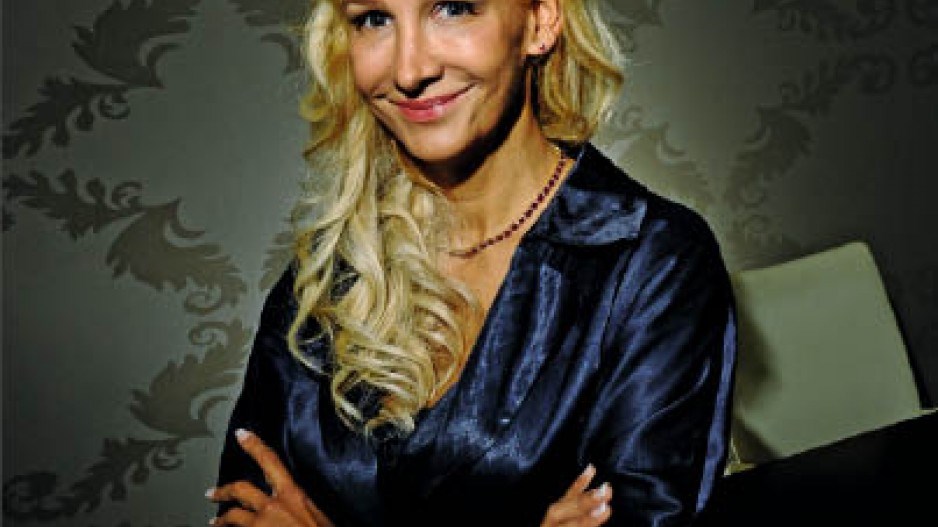Penny Green's first case, as a second-year law student, in no way foreshadowed the trajectory her legal and business career would take.
Green's boutique law firm, Bacchus Law Corp., specializes in business and securities law. It's pretty far removed from her first case: defending a Polynesian hula dancer who worked in an exotic dance club and was being sued by her former instructor for breach of copyright.
“I won that case,” Green said. “Not only that, I set a precedent in copyright law. The judge basically accepted my argument that you couldn't copyright language, and that Polynesian dance is like a language.”
Green was 22 and had taken the case as part of a program that gave low-income people free legal help from law students.
After earning a law degree, she worked for small and large law firms, and did some litigation, which she didn't like. What she really liked was business and securities law.
“I always loved the public markets,” she said. “Even though I didn't know much about them, as a teenager I was thinking, ‘Wouldn't it be great to be a stock broker?'”
Born and raised in Toronto, Green moved to Vancouver 19 years ago when she was accepted to University of British Columbia's faculty of law. While in university, she did some student exchanges that allowed her to spend a year in Spain and a semester in France.
Early in her career, she took an interest in entertainment law. After university, she got a job at Lang Michener LLP, which allowed her to do securities law while building her own entertainment law practice. It was while working with entertainment companies that she learned how to help companies raise money.
“In film, everything costs a lot of money,” she said. “It just became [apparent] that I needed to know about securities.”
At 26, Green left Lang Michener to build her own law firm. She started two companies: Bacchus Law Corp. and Bacchus Entertainment.
Green specialized in taking companies public, and many of them were listing on the loosely regulated Over the Counter Bulletin Board (OTCBB). Because she was doing so much work on both sides of the border, she decided in 2005 to write her bar exam in Washington state, and was called to the bar in the U.S.
The OTCBB has a reputation as a place where delisted companies go to die, startups go to suffer crib-death and shysters flog shady stocks. A few years ago, Green stopped recommending her clients list on the OTCBB.
“The reality is there is a lot of people in that business that you can't trust,” she said, “so it's a difficult place to do business.”
But the main reason she advises against listing on the OTCBB is that the investment dollars, particularly for technology companies, have dried up.
“I certainly don't advise any of my clients to list there because there's no money down there,” Green said.
Although her firm Bacchus Law Corp. is 14 years old, most of its growth has been in the past four years. Green said the firm's revenue has grown 54% in the last three years, and she now has a staff of 14.
Green attributes her company's success, in part, to having children, which forced her to stay home and work.
“When I started having kids is when my law firm really took off, because I had to stay home,” she said.
Green is a single mom with three young children, aged four, six and seven. Initially, she ran her law firm from the attic of her home in Shaughnessy. (Her office is now on the 18th floor of the Cathedral Place office tower in downtown Vancouver.)
“All of a sudden you're grounded,” she said. “So, I just worked. When the kid was sleeping, I'd go upstairs and work.”
She doubts she could be a practising lawyer with three children, if she didn't own her own law firm.
“I would have a really hard time with three kids, because I would be expected to put in at least eight to 10 hours a day at a large law firm,” she said. “So having my own firm has really enabled me to have the lifestyle I want.”
Green believes the key to her success is that, being an entrepreneur herself, she understands what other entrepreneurs need. Her company works with a lot of technology startups, like RESAAS Services Inc., which developed a social network for the real estate sector.
When RESAAS was starting out in 2009, CFO Cam Shippit said the company chose Green's firm because of its reputation in the technology community.
Green's company helped RESAAS write a prospectus and then helped it list on the Canadian National Stock Exchange (CNSX), which is an alternative to the Toronto Stock Exchange for micro-cap and emerging companies. The company raised $1.4 million on its initial public offering in February and has raised another $4.4 million in private placements.
Shippit likes the intimacy of working with a small law firm.
“We know everybody there,” he said. “I can pick up the phone and talk to any of them, and I get great service. It's almost like a family type atmosphere. It's not like a huge firm where you don't know anybody.”
In addition to her law firm, Green co-founded Merus Labs International, which buys and licenses pharmaceuticals. She also owns Bacchus Filings (a corporate services company) and co-founded and chairs Highbury Biofuel Technologies Inc., a biotech startup that makes syngas from wood waste.
Green has been recognized recently by a number of legal and business publications. Corporate International Magazine this year named her one of the top 50 lawyers in Canada, and Green was included on 2011's ProfitW100 list for top female entrepreneurs.




